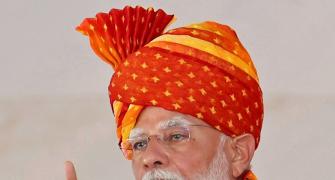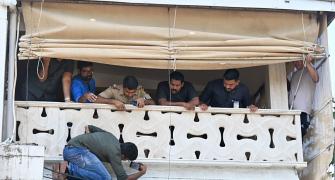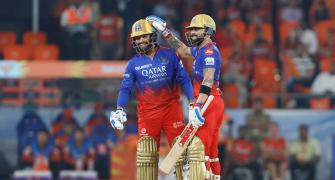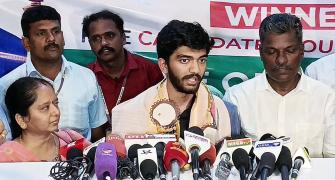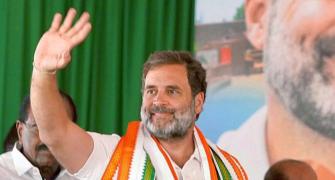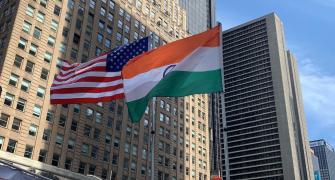The prestigious Delhi Metro Rail project, which has become a bone of contention between the Centre and the Delhi government, with both trying to hog the credit, is set for a formal launch on Tuesday.
Prime Minister Atal Bihari Vajpayee and other top politicians, including Chief Minister Sheila Dikshit will be on board a train that will move out of Shahdara.
But even at this late hour, it is unclear if Leader of the Opposition Sonia Gandhi will attend the launch and ride the train to Tees Hazari with the prime minister. Gandhi's aides said she is scheduled to visit Andhra Pradesh on Tuesday. The Union urban development ministry has invited her to attend the inauguration.
Recently, the Centre had issued an ordinance taking over the project and installed former Delhi chief minister Madan Lal Khurana as chairman of the Delhi Metro Rail Corporation Limited.
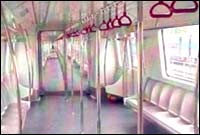
Seventy-year-old engineer E Sreedharan, the man who is widely credited with having made the Konkan Railway possible, was appointed DMRC managing director in November 1998 after the organisation had remained headless for more than two years after its formation in May 1995.
Sreedharan is confident that the rail service will be a success and mitigate the miseries of commuters in the capital. "In stage one," he said, "the railway will cover a distance of 8.3km between Shahdara and Tees Hazari in less than 13 minutes at a frequency of 8-10 minutes."
The DMRC has acquired six engines and 24 coaches for six trains. More than 20,000 men and women employed directly and indirectly by the DMRC are working round the clock to ensure that the projects are completed on schedule.
"We have imported three tunnel-boring machines from Germany and they are working ceaselessly," Sreedharan told rediff.com. "We have completed a 903m long underground tunnel from Patel Chowk to Connaught Place. We began drilling in July this year and had set a target date of December 20 to complete it. I am happy that we have managed to do our job in time. These machines have on an average cutting rate of 8-9 metres a day. But at times we have managed to bore up to 25 metres a day depending upon the kind of soil."
The second boring machine will link New Delhi railway station with the Connaught Place tunnel by January 3, 2003. The third tunnel linking Old Delhi railway station with Kashmiri Gate is scheduled to be completed by November 2003.
Every day, more than 1,700 truckloads of mud and concrete are being ferried out from these tunnelling sites to low-lying areas in trans-Yamuna.
Sreedharan said the technology used was similar to the one used to construct the Channel tunnel linking England and France. "The country can be truly proud of this engineering marvel," he said.
The managing director said the 'safety first' and environment-friendly features of the Metro will make this mammoth project unique. "The noise level and track and passenger safety have been given highest priority," he said.
The Metro will cover a distance of 62km both underground and overground in three phases between December 24, 2002, and September 2005. The places that will be linked by the DMRC are Shahdara and Tees Hazari, Tees Hazari and Tri Nagar, Tri Nagar and Rithala, Delhi University and Kashmiri Gate, Rithala and Barwala, Barakhamba Road and Kirti Nagar, Kashmiri Gate and Central Secretariat, and Kirti Nagar and Dwarka.
When complete, the DMRC is expected to ferry 2.5 million commuters daily, resulting in saving 2.6 million man hours every day by cutting travel time by as much as 50 per cent.
About the alleged lack of safety clearance for the Metro to begin operations, Sreedharan said, "We don't know who is spreading these rumours. We have got all the clearances from the Ministry of Railways, particularly from the railway safety commissioner. We have got clearances to lay track, do lighting, etc. We have checked the brake systems and I can tell you that the Metro rail is definitely safe for travel.
"We have the co-operation of the Delhi police to check crime against women. We also have a large number of volunteers and our own men to ensure safe travel for women commuters."
Talking about the increasing death rates in the Kolkata metro railway system, Sreedharan said there is a need to educate people. "We have drawn lines at platforms and people are not expected to cross them before the train arrives," he said. "I hope people realise that their lives are far more important than travelling quickly. Since there will be a train every eight minutes initially and every three minutes later, waiting for another train is definitely not a long wait."
The DMRC has laid down stiff penalties for drunken behaviour, vandalism, and indecency. "We intend to fine offenders Rs 500 for each of these offences," Anuj Dayal, chief public relations officer, told rediff.com
Putting up posters in the DMRC or defacing property will attract six months' imprisonment and a fine of Rs 1,000. Damage to property or causing fire hazards or explosions will result in imprisonment extending up to 10 years.
The DMRC plans to run feeder bus services to ensure that autorickshaw and taxi drivers do not take rail commuters for a ride once they complete their journey on the Metro.
With these plans, the project has certainly raised the expectations of the people in Delhi. But whether it lives up to them remains to be seen.

